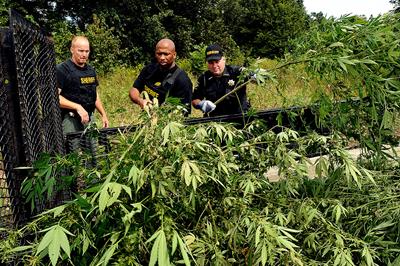
Friday January 15, 2016
 News
News
There’s been a recent flood of arrests in connection with illegal grow operations in Colorado. Around 20,000 plants and 300 kilograms of dried marijuana were confiscated from multiple grow sites throughout August and September 2015 along with pesticides, flammable liquids and 30 firearms.
Much of the illegal marijuana is believed to be part of an illegal drug ring based out of Minnesota, as were the illegal grow operations in central Denver that were busted last year. Some speculate that California’s drought may have inspired illegal marijuana grows to move east, as well. After all, Colorado has plenty of land (and water) and a legal system that makes it much easier to go undetected.
The Impact of Marijuana Legalization on the Black Market
Colorado made $26 million less than they expected during its first year of recreational marijuana sales, not because of fewer users, but because of an active black market that functions in a grey area of the law. Many caregivers and personal growers, for example, may grow their own marijuana and give away excess to whomever they see fit (as long as they’re over 21). As long as no money, goods or services are traded in the exchange, no laws are broken by receiving cannabis from a non-licensed individual.
This makes tracking the transfer of marijuana more difficult than it has been in the past. Years ago, if someone grew and distributed cannabis illegally, it would be fairly easy to find and convict them for their crime. Today, illegal grow operations can cultivate thousands of cannabis plants and sell them under the guise of a legal system; if it is legal to transfer small quantities of marijuana without a license, then it is much more difficult to find and convict black market dealers.
Solutions to Colorado’s Illegal Marijuana Market
A tracking system called METRC (which stands for “Marijuana Enforcement Tracking Reporting Compliance”) has been designed to help curb black market activity. The system is the first of its kind, designed to help government officials monitor cannabis throughout its entire lifecycle -- from seed to sale, each plant is tracked to streamline the regulatory process and reduce the amount of black market sales.
The system is designed using a “closed loop” structure which not only helps reduce black market activity, but also reduces the chance of Federal intervention. So far, the system has been effective at reducing the transfer of legal marijuana to an illegal market. According to Denver Police Department Lt. James Henning, the cannabis industry is doing so well that most industry members don’t want to risk non-compliance. In other words, the illegal marijuana market is being fueled by illegal grow operations and not a shotty industry.
Plant limits help control Colorado’s illegal marijuana trade even more. Unlicensed marijuana collectives, for example, have recently been capped at only 36 plants and private growers are limited even further. Prior to this limit, private growers or “caregivers” could grow an unlimited number of plants provided that they were growing them for patients. This allowed non-licensed individuals and groups of people to cultivate thousands of marijuana plants and to distribute excess harvest however they pleased. Many collectives sell their overflow on places like Craigslist where “donations” are requested in lieu of payment as a way to dodge the law.
The Future of the Marijuana Black Market
One major pull for marijuana reform is the destruction of the marijuana black market. Unfortunately, marijuana’s federally illegal status has slowed the process. The fact is, many people love weed and they will find ways to get it whether or not they live in 420-friendly states. For criminals with a taste for success and a low aversion to risk, the illegal marijuana market is an attractive solution and Colorado’s relaxed marijuana laws make for a great place to stock-up on product.
Despite laws that allow adults to cultivate small amounts of marijuana, a larger black market industry can make it tempting to push the limits. But illegal grow operations do not support the industry and they are not good for the consumer; their products are not regulated and their tax avoidance increases the likelihood of federal intervention and legal industry collapse.
Unfortunately, the only way to significantly reduce illegal grow operations in Colorado is to lift the federal ban on cannabis all together. Until then, Colorado will continue to be an attractive location for black market criminals and law enforcement will continue to have to deal with them.
Photo Credit: Politics of Pot







